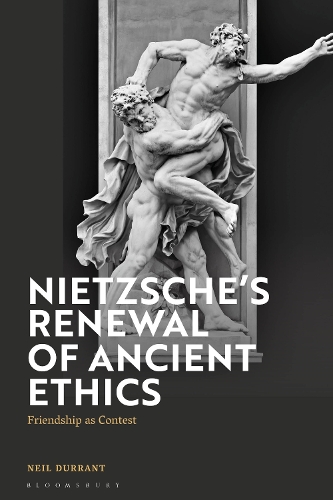
Nietzsche's Renewal of Ancient Ethics: Friendship as Contest
(Hardback)
Available Formats
Publishing Details
Nietzsche's Renewal of Ancient Ethics: Friendship as Contest
By (Author) Neil Durrant
Bloomsbury Publishing PLC
Bloomsbury Academic
26th January 2023
United Kingdom
Classifications
Professional and Scholarly
Non Fiction
Ancient Greek and Roman philosophy
170.92
Physical Properties
Hardback
224
Width 156mm, Height 234mm
Description
Nietzsches Renewal of Ancient Ethics connects different strands in Nietzsche studies to progress a unique interpretation of friendship in his writings. Exploring this alternative approach to Nietzsches ethics through the influence of ancient Greek ideals on his ideas, Neil Durrant highlights the importance of contest for developing strong friendships. Durrant traces the history of what Nietzsche termed a higher friendship to the ancient Greek ideal of the Homeric hero. In this kind of friendship, neither person attempts to tyrannize or dominate the other but rather aims to promote the differences between them as a way of stimulating stronger and fiercer contests. Through this exchange, they discover new heightsnew standards of excellenceboth for themselves and for others. Durrant shows how the development of this approach to personal relationships relied on Nietzsche rejecting the Christian ideals of love and compassion to build an ethics which incorporated aspects of evolutionary biology into the ancient Homeric ideals he was himself wedded to. The resulting higher friendship is strong enough to include not only love and compassion, but also enmity and opposition, expanding our notion of what is good and ethical in the process.
Reviews
Nietzsches Renewal of Ancient Ethics brings vitality to Nietzsches ethics through an exploration of the significance of his agonism for friendship. It brings agonistic relations into the personal realm in an engaging and lively manner. * Paul Kirkland, Associate Professor of Political Science, Carthage College, USA *
This book brilliantly illuminates Nietzsches ethics of heroism, which places great love and higher friendship at its center. Durrants excellence as a reader is particularly evident in his demonstration of how Nietzsches agonism both informs and is informed by his psychology of the drives. Anyone interested in Nietzsches ethics will profit from this book. * Robert Miner, Professor of Philosophy in the Honors College, Baylor University, USA *
Author Bio
Neil Durrant is Faculty Executive Director in the Faculty of Arts at Macquarie University, Australia.
